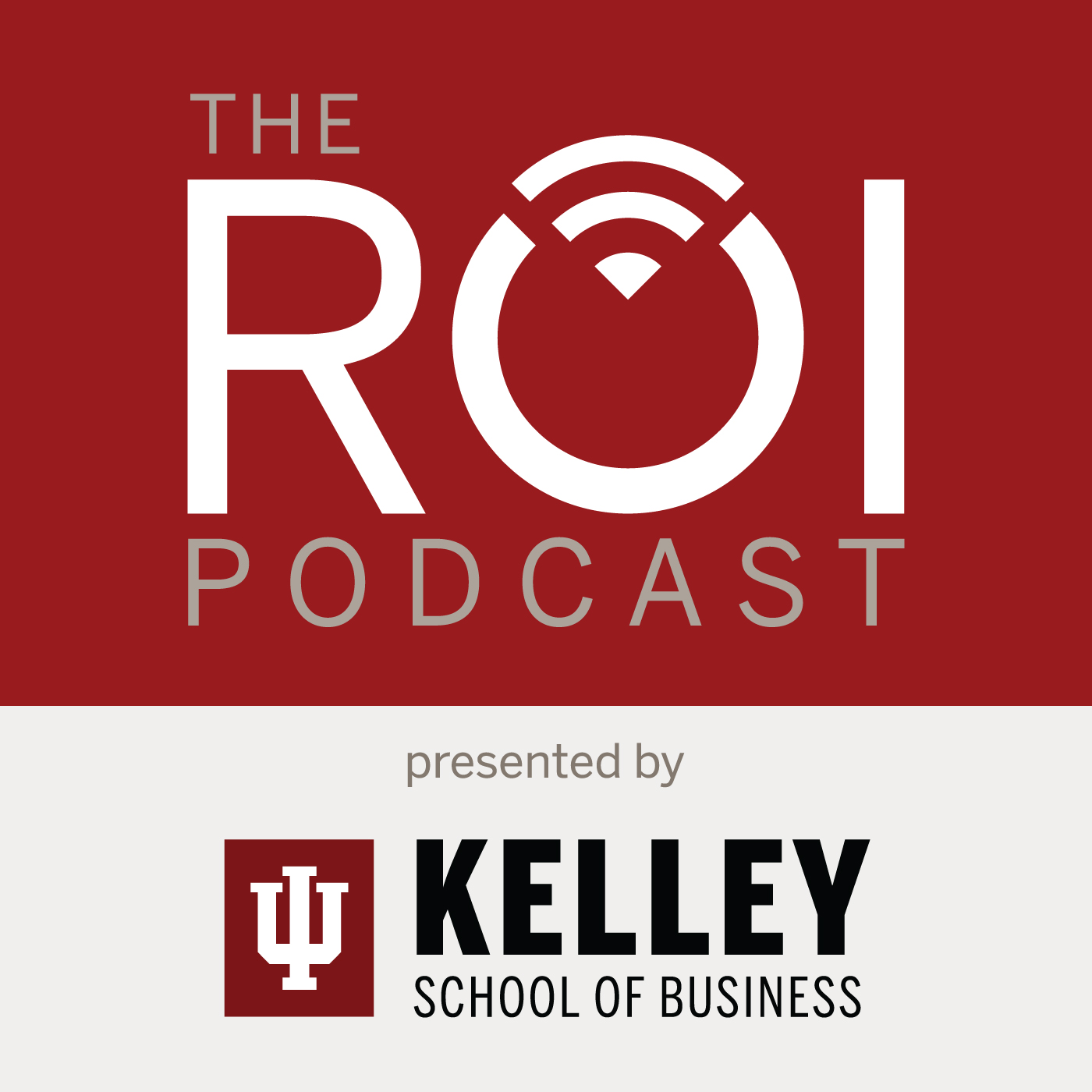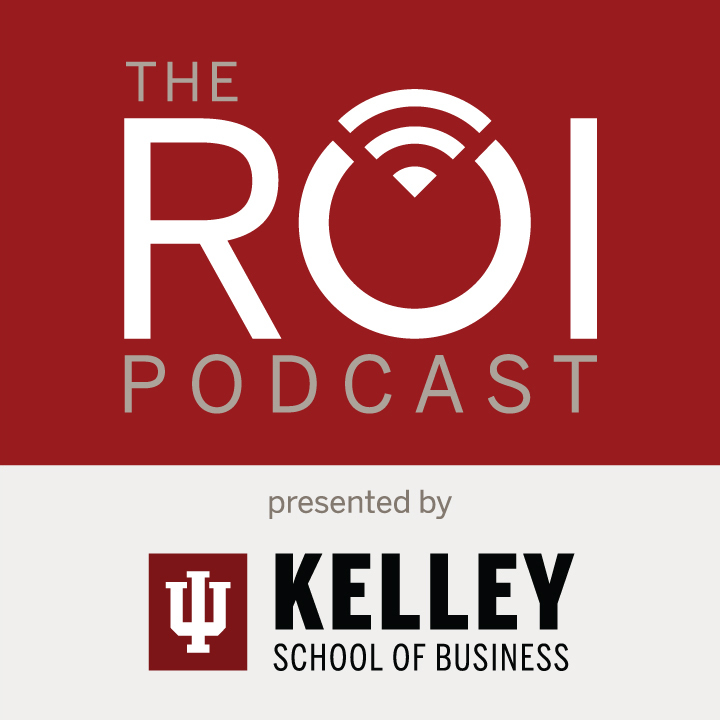
The ROI Podcast provides professionals from all industries with actionable insight from world-renowned faculty members at Indiana University's Kelley School of Business. Learn not only from award-winning faculty but business experts who are disrupting their respective industries. The ROI Podcast equips you and your organization with the knowledge to keep a competitive edge over the competition.
Episodes

Thursday May 03, 2018
How companies can skyrocket profits through social impact investing | Ep. 46
Thursday May 03, 2018
Thursday May 03, 2018
What if you could increase profits and help the community and environment all at the same time? Social and environmental strategy isn't just charity, they can produce real profits for organizations. In this episode of The ROI Podcast, Jay Geshay reveals how to skyrocket profits through social impact investing.
----
Do you have a question? Looking to get help on a business decision? Know a great guest for our show? Email roipod@iupui.edu so we can help your organization make better business decisions.
----
Ready to take your next step? Check out if a Kelley MBA is right for you: https://bit.ly/3m2G6D5
----
Show Notes:
Shane: We are in the midst of a global shift – and have been for the past few years. Millennials and Gen Z consumers care more about where their products come from and how they are produced – with an emphasis on global sustainability… More and more investors are putting their capital where it aligns with their social objectives – and this is changing the game as we speak… Let’s get to the podcast!
(ROI Podcast Music)
Shane: Hey everyone! Shane Simmons here and welcome into another episode of The ROI Podcast presented by the Indiana University Kelley School of Business. We are recording this from the IUPUI campus in downtown Indianapolis on a beautiful spring day. I’ve got the associate dean of academic programs, Phil Powell, here beside me once again. Phil, how are you?
Phil: (Response)
Shane: Let’s talk about social impact investing. Phil, I feel like when this topic was discussed previously, it wasn’t as attractive as it is today…
Phil: Some would say the social impact is simply charity in disguise and it’s going to cost the stockholders value and try and broaden the scope of a for-profit organization… But according to Jay Geshay of United Way, an expert in social impact investing, companies who are investing in socially positive practices have reaped a multitude of benefits.
Jay: In a traditional view of capitalism, you could definitely say that's the case - when you take your eye off the ball, when you get off your hedgehog idea, you consider that would dilute revenue and profitability. I think what you're seeing in missional companies - companies that are created to solve problems that are social in mind, whether it's around education or healthcare - when a company is missional, the social impact is embedded in it. What research is finding is companies that are doing this social good retain their employees more, are actually able to maintain or improve profits, and if you look at companies that are over 100 years old and you do a study of those, you'll see that a successful company are those that bring in the community and help as part of them, solving their issues, and not just using them for profits.
Phil: Now, some people may have some preconceived notions in their head of what social impact investing is – and may get it mistaken for charity… Jay breaks down this misconception.
Jay: If you look at a charity, it's basically high social impact, but -100% in ROI. Charities outstand ably, philanthropy plays a huge role in our society. If you look at social impact, it's really changing measurable outcomes in our community for the better. But when you look at social impact investing, yes, it's changing the social impact outcomes, but it's also returning a percentage on the financial side. If you look at many reports and research that has come out, they're showing that social impact funds, like Colorado Impact Fund, for example, are actually achieving market rates of return.
Phil: So what has happened over the past two decades. Why are we seeing this shift to social impact investing?
Jay: I think the traditional view twenty years ago is if I want to make money, I do things like venture capital and private equity, but if I want to do good, I give to United Way - those two do not cross. But we learn through experience, by seeing success in those that are trend-setters and are on that edge of learning. We've learned that you can do both, and that social impact investing can return a market rate of return.
Shane: But society is also changing… Values have shifted, especially with generations like millennials and gen z…
Phil: That’s true… And there are companies out there who are making social responsibility the backbone of everything they do. Rather than looking at profits, they’re looking at the impact on people and their community. And Jay says talks about some of those organizations he’s seen.
Jay: Eli Lilly, although they would never say they were a social impact company, I think by the way they operate and work within the community with United Way, we worked strategically with them on early childhood and was able to advance that in our state. I think about all the good that they do in our community and what their stock does as well through Lilly Endowment. But if I were to look at some companies that aren't as well-known, I would probably look to Endova, they're out of Chicago and they're a start-up company funded by another social impact fund called the Impact Engine. They do education for prisoners, on a tablet, and their goal is to help recidivism be reduced so that when they exit out of prison, they can do that. Another [idea] that I find very interesting is an app that is on your phone for food stamps, called EBT Fresh
Phil: So if you’re a young manager out there – and you’re wanting to make sure your company’s social and environmental values are aligning with this notion of social responsibility – you’re probably asking, “What can I do? How can I play a part?” Jay answers that here:
Jay: I would caution a young manager to try to move an organization towards a social Enterprise status. Because the social enterprise, the heart of it, really needs to come from the top and come from the founders or the owners of the organization. I would encourage a young manager to think more in terms of corporate social responsibility. Because I think you can do corporate responsibility and combat it more from retaining employees, the brand lift of an organization. And I think that organizations that aren't missional focused on social impact can still look at CSR… And they can say, “Yes. It is helpful if our employees can do volunteer work in the community. It is helpful if we can run a United Way Campaign, it is helpful if we do these things well in the community because the value back to the company is measured by employee engagement and satisfaction and brand lift. Rather than come at it from a social impact side, I’d probably come at it from a CSR side, unless you can convince the owners otherwise, but typically I think it would be hard to shift the missional focus of an organization.
Phil: You know, Shane, like all great ideas, the application of them evolves over time. What we are seeing now is something fundamental. A convergence between profit, and a sense of social mission or social impact. In the past, in many ways, our business models and our charity models made those mutually exclusive, as you've said. But innovation and newness of thought and change in social values now make that one in the same. And the good news is, the more those converge, the more good we have for everyone.
(ROI Podcast Music)
Shane: (Closing Remarks)

Comments (0)
To leave or reply to comments, please download free Podbean or
No Comments
To leave or reply to comments,
please download free Podbean App.